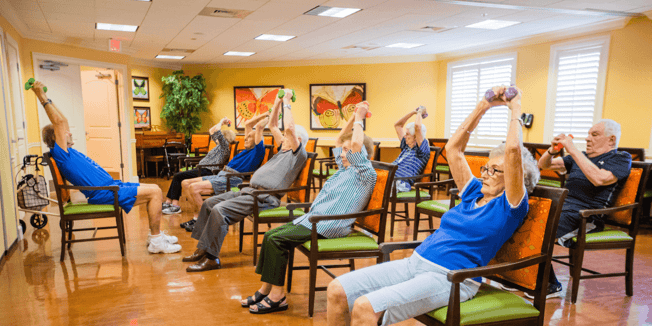The Importance of a Comprehensive Program of Treatment in Assisted Living Settings
In helped living setups, the execution of a comprehensive program of treatment is necessary for dealing with the complex needs of citizens. Such programs not only incorporate medical and emotional services yet also foster social involvement, which is vital for boosting overall well-being. By focusing on personalized care plans and entailing families at the same time, these programs can considerably boost health end results and lifestyle. The concern continues to be: what particular methods can be utilized to make certain that these programs are successfully tailored to fulfill the distinct needs of each homeowner?
Comprehending Comprehensive Treatment Programs
As helped living facilities remain to progress, understanding extensive treatment programs becomes vital for both homeowners and their family members. Comprehensive treatment programs are created to attend to a large variety of requirements for people living in aided living settings, making sure that each resident receives tailored assistance that reflects their one-of-a-kind health problems and way of life choices.

Family members play an indispensable role in this procedure, participating in treatment planning and continuous discussions to make certain that the homeowner's requirements are continually fulfilled. Comprehending these programs is crucial for making notified decisions regarding treatment options and making the most of the high quality of life for locals in assisted living facilities.
Advantages for Citizens

(Dementia Care Charlotte)One key benefit of detailed care is the renovation in wellness outcomes. Normal tracking and coordinated healthcare assistance in the very early detection and management of chronic problems, lowering hospitalizations and emergency treatments. Locals benefit from improved social interaction, as structured activities and programs promote a feeling of community, combatting sensations of seclusion and loneliness.
Furthermore, homeowners experience increased comfort, understanding that specialist assistance is conveniently available must they call for help. This guarantee allows them to concentrate on appreciating their everyday tasks and preserving significant connections.
Function of Caretakers
Caretakers play a crucial function in the well-being of residents in nursing home, making certain that their demands are consulted with empathy and proficiency. They function as the main factor of call for citizens, giving vital assistance in day-to-day tasks such as showering, clothing, and medicine management. Their existence not only promotes physical health and wellness yet additionally boosts psychological and social wellness by fostering relationships improved count on and understanding.
Along with supporting daily living tasks, caregivers are important in monitoring adjustments in locals' wellness and behavior. They are educated to acknowledge subtle indicators of distress or decrease, making it possible for timely interventions that can stop issues. Their knowledge of each citizen's distinct history and preferences allows them to deliver tailored treatment, enhancing the general lifestyle.
In addition, caregivers act as advocates for residents, connecting their demands and choices to various other health care experts and relative. This campaigning for is important in producing a holistic care environment that respects the dignity and freedom of each individual. Inevitably, the dedication and skill of caretakers are crucial components of a comprehensive program of care, underpinning the success of assisted living setups.
Customizing Care Plans
While every resident in assisted living has unique needs and preferences, personalizing care strategies is crucial to delivering effective and individualized assistance. A one-size-fits-all method to care can neglect crucial facets of individual wellness, possibly causing suboptimal end results. Memory Care. A complete evaluation of each homeowner's health and wellness status, individual history, and way of living selections is vital in creating customized care approaches.
The customization process includes cooperation among healthcare professionals, caregivers, and member of the family. By integrating input from all stakeholders, care strategies can deal with not only medical requirements however likewise psychological and social factors that add to total high quality of life. Regular evaluations and updates to these plans guarantee that they stay pertinent as homeowners' conditions and choices develop gradually.
(Dementia Care Charlotte)Furthermore, customized treatment plans promote a feeling of dignity and freedom among citizens, promoting a setting where they feel valued and valued. This tailored technique not only boosts the performance of treatment but additionally enhances the relationship in between caretakers and locals, developing a helpful community ambience. Ultimately, purchasing personalized treatment preparation is a cornerstone of giving high-grade assisted living solutions that satisfy the varied requirements of citizens.
Enhancing Neighborhood Interaction
Building on the structure of customized care strategies, enhancing community interaction is a crucial facet of enhancing the general experience for residents in assisted living (Assisted Living). Active participation in area activities cultivates social dig this links, battles sensations of isolation, and contributes to psychological health. Helping with chances for residents to engage in group tasks, such as art courses, horticulture, and exercise sessions, develops an inclusive atmosphere that promotes communication and partnership
Furthermore, integrating locals right into the broader area via collaborations with regional companies can provide enriching experiences, such as volunteering and going to social occasions. This not just assists homeowners feel valued however additionally reinforces connections with the bordering area, boosting their sense of belonging.
Furthermore, urging household involvement in community tasks is crucial. Memory Care. Household participants can function as vital support systems, assisting to bridge the void in between locals and the community. Routine household events and open discussion forums for discussion foster openness and partnership, making sure that the care atmosphere continues to be responsive to the needs of all stakeholders
Final Thought
In verdict, comprehensive care programs in assisted living settings play an essential role in enhancing citizens' health. The participation of households in treatment planning strengthens assistance networks, cultivating a sensible and self-governing living environment.